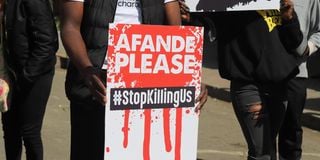When innocence meets uprising: Nakuru parents struggle to explain protests to children

A protester displays a placard alluding to police brutality during protests in Nakuru CBD on June 25,2025.
Last weekend, as I took a stroll through my estate, I came across a group of young boys and girls playing, which is pretty normal.
However, what I found interesting was that they imitated a group of demonstrators running from the police.
This was evident when I heard one of them saying that a tear gas had been lobbed at them and they were running away. Two other boys ran after them from a distance.
You see during my childhood, we played a version of this game but it did not involve protestors and police, it was more of police and robbers. It seems with the current times, syllabus imebadilika kidogo.
Every day, it becomes more apparent that children are picking up on the current political temperature in the country.
How would they not when they receive reports of their neighbors, school mates injured or killed during the protests?
It is this realization that has forced Nakuru parents to discuss with their children the reality of the demos.
John Gitau, a father to a grade 7 student says he wishes he would be able to shield his daughter from all the gruesome things that are happening in the country, but this task has proven impossible.
“As much as you try to hide all the current happenings from the children, remember they go to school and interact with other children and they tell each other stories. I remember my child coming from school and telling me how Boniface Kariuki was shot and I really lacked words,” he says.
Gitau says that on July 7, his daughter pleaded with him not to go into the city centre.
“She told me, ‘Baba usiende town wanashoot watu’. It did not escape me that she knew what was going on,” he says.
Ann Njeri, another parent, says she did not know how to explain to her son the reason for skipping school on July 7.
“I was just honest with my boy and told him there were people protesting because of ‘issues involving the government’ without getting into the details,” she says.
“I would try and prevent him from watching television and send him out to play with his friends in the estate but the moment he comes back in the house, he has more information than me,” Njeri adds.
Across social media platforms, I have also come across clips of children playing and instead of the normal cha mama and cha baba, they are chanting anti-government slogans, as they played within their residential areas.
This year alone Nakuru has witnessed a number of protests, including the seven-day protests in Kivumbini, the two-day protest in London, June 25th protest and the latest one being the Saba Saba day protests.
What began as an innocent game among children in the estate revealed something far deeper the line between play and reality is blurring.
As parents grapple with how to explain complex national issues, it becomes clear that shielding children from the truth is no longer an option.
